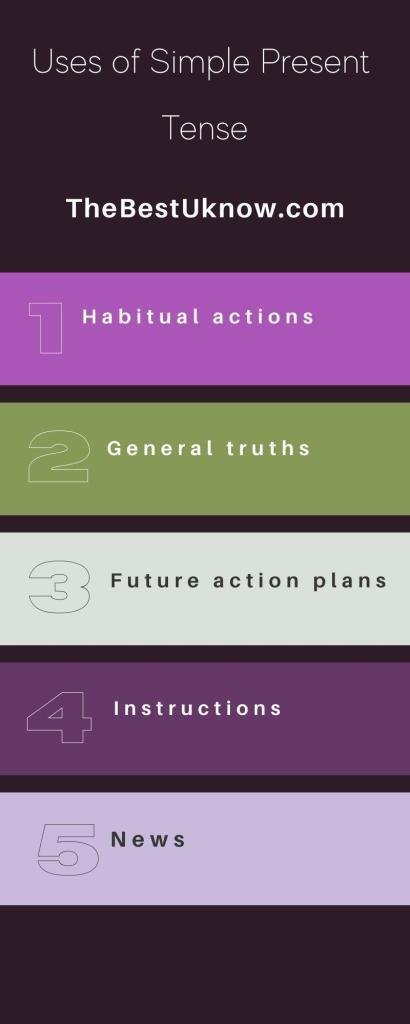Simple Present Tense – Use to Express
In Simple Present Tense, Verb shows the present time without telling about the completion of the action. But it tells simply.
Simple Present Tense is used to express-
- habitual actions
- general truths
- repeated actions
- to tell about future action plans
- to give instructions
- in News
Simple Present Tense- Uses and Examples

Here are the uses of simple present tense with examples.
Habitual action
* Simple Present Tense is used to express habitual actions in the present.
We shall see what ‘habitual action’ actually is!
Definition of habitual
Habitual is the adjective form of habit. Habit means anything we do repeatedly.
Meaning of habitual
The meaning of habitual is the same action we do frequently.
Present simple tense is used to tell about the habits; as,
- He smokes.
- I get up at 5 am every day.
- Architecture students visit monuments every Sunday.
- He participates in every dance competition.
- She drinks coffee in the afternoon.
General truths that are Facts
We use present simple tense to express general truths that are facts.
- We use present simple tense to express something, that is, always true.
- As the speaker thinks, that the situation was true in the past, is true now, and it will be true after this, that is in the future.
Here are some examples of the general truths.
- The Sun rises in the east.
- Earth revolves around the Sun.
- A cat has a tail.
- Fish is an aquatic animal.
- Mumbai is in India.
Repeated action
Present simple tense is used to tell about repeated actions; as,
- He never stands by me.
- We sometimes play on that ground.
- She goes to the office every day at 9 o’clock.
- You always forget your wallet.
- Every weekend I have a holiday.
Future action plans
Simple Present Tense is used to tell about future action plans; as,
- College reopens on 13th June.
- The bus passes in the morning at 6 o’clock.
- The lecture starts at 9 o’clock.
- He arrives tomorrow.
Instructions
We use Simple Present Tense to give instructions; as,
- Stay here and wait for bus no.34.
- Ask the conductor about your stop and get down.
- Walk for two hundred meters and then turn right.
- Wrap the gift in a coloured paper.
- Open the door.
News
In the newspaper headlines, we always use Simple Present Tense; as,
- Chief Minister meets Prime Minister.
- The Indian cricket team arrives in Delhi.
- There is a discussion about security in assembly.
- Dhoni takes a wicket.
Conditional sentences
We can use Simple Present Tense in conditional sentences; as,
- If I go there, I shall buy it.
- If you win the competition, I shall be very glad.
- If you stand first in your class, I shall gift you a silver pen.
Question about use of simple present tense
There is always a question in our mind-
♦ Which one of these is used to express habitual actions?
- present perfect tense
- simple present tense
- past continuous tense
- present continuous tense
The answer is-
- The simple present tense is used to express habitual action.
♦ Which tense is used to express general or universal truth?
♦ Which tense is used to express general truths and facts?
Again the answer to both above questions is-
- The simple present tense is used to express general or universal truth.
You may also like-
| Related Links | |
| Present Tense | Present Continuous Tense |
| Perfect Present Tense | Perfect Continuous Present Tense |
| Past tense | Future tense |